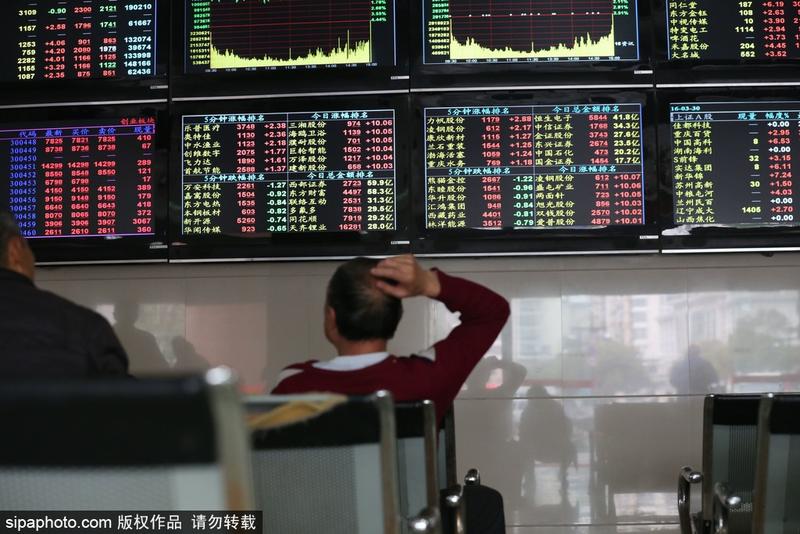 China's slew of measures to facilitate corporate bond financing amid the fight against the novel coronavirus outbreak have started to bear fruit and helped minimize losses from the epidemic, analysts said. (PHOTO / SIPA / CHINADAILY.COM.CN)
China's slew of measures to facilitate corporate bond financing amid the fight against the novel coronavirus outbreak have started to bear fruit and helped minimize losses from the epidemic, analysts said. (PHOTO / SIPA / CHINADAILY.COM.CN)
China's slew of measures to facilitate corporate bond financing amid the fight against the novel coronavirus outbreak have started to bear fruit and helped minimize losses from the epidemic, analysts said.
Companies hit by the epidemic also issued anti-epidemic-themed bonds to surf through liquidity difficulty
By Friday, 10 corporate bonds and one asset-backed security (ABS) had been issued under the "green channel" policy package and raised 11.23 billion yuan (US$1.6 billion) in total, with part of the funds to be used in epidemic control, the China Securities Regulatory Commission said over the weekend.
The top securities regulator also said that three companies registered in Wuhan, Hubei province, the epidemic epicenter, had got approval via the channel to issue bonds worth 2.8 billion yuan in total.
ALSO READ: With banks' help, companies get low-cost funds for fight
"The green channel policy package has helped enterprises in the frontline of epidemic control to fully leverage market-oriented financial instruments in resuming or expanding production as soon as possible," said Dong Dengxin, director of the Finance and Securities Institute at the Wuhan University of Science and Technology.
China said on Feb 1 that it would establish the "green channel" for the issuance of corporate bonds and ABS by businesses registered in Hubei province and other severely hit areas, as well as those raising funds to contain the epidemic.
For bonds qualified for the green channel, or the so-called anti-epidemic-themed bonds, securities exchanges have streamlined the procedures of bond review and issuance, assigned one special team to take charge of each bond issuance, and made flexible arrangements to cater to any special needs.
For instance, the CCCC Second Harbour Engineering Co Ltd, the contractor of several underway sanitation construction projects in Wuhan, issued ABS worth 230 million yuan on Friday to support project construction, thanks to special issuance arrangements of the Shanghai Stock Exchange.
The bourse extended the period of financial data validity for the purpose of ABS registration for the contractor, as it could not update financial statements as scheduled due to the epidemic, the SSE said on Monday.
Companies hit by the epidemic also issued anti-epidemic-themed bonds to surf through liquidity difficulty, with roughly half of the funds raised as of Feb 11 being used for debt redemption, according to data compiled by China Merchants Securities.
A case in point is Sichuan Kelun Pharmaceutical Co Ltd which issued a 270-day commercial paper with a 2.9 percent coupon rate on Feb 5. The 800 million yuan raised is being used to repay debts and replenish the liquidity used in the fight against the epidemic, said a company announcement.
It should be noted that the 2.9-percent coupon rate is lower than the 5.27 percent for the company's securities with similar maturities, and such low-cost financing is common among anti-epidemic-themed bonds, said Zhou Guannan, chief fixed-income analyst with Hua Chuang Securities.
Institutional investors snapped up the anti-epidemic-themed bonds out of their need to allocate money as well as their social responsibility to suChinese listed banks see steady revenue growth in 2019pport the battle against the virus, Zhou said.
"This helped reduce financing costs of the issuers and buffer the shocks of the epidemic on real-economy enterprises. As regulators further roll out detailed regulations, issuance of anti-epidemic-themed bonds may speed up," Zhou said.
READ MORE: Chinese listed banks see steady revenue growth in 2019
Yet, Zhou said investors should remain rational toward this type of new bonds, as issuers' solvency will not get a major boost because of policy support.
Dong stressed the importance of maintaining a proper set of standards when determining which enterprises are qualified for the green channel, such as regarding the scope of primary business and the stability of financial position.
Shi Jing in Shanghai contributed to this story.



